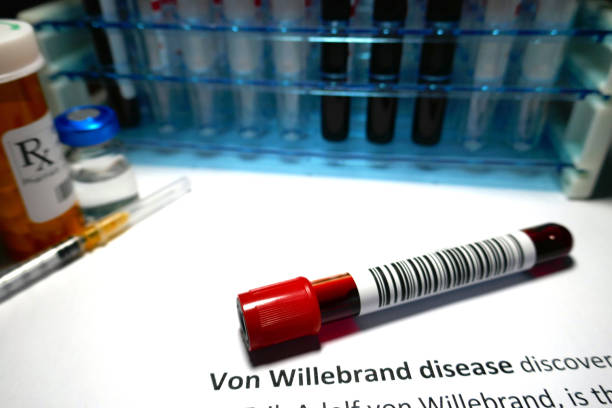
Von Willebrand disease - blood disorder abstract.
Antithrombin Deficiency
What is Antithrombin Deficiency?
Antithrombin deficiency is a rare genetic condition characterized by low levels or dysfunction of antithrombin, a protein in the blood that helps regulate blood clotting. Antithrombin inhibits several enzymes in the coagulation cascade, preventing excessive clot formation. Individuals with this deficiency are at increased risk of thrombosis (blood clots).
Types of Antithrombin Deficiency:
- Inherited Antithrombin Deficiency: A genetic disorder often passed down in families, leading to reduced levels of antithrombin.
- Acquired Antithrombin Deficiency: Can occur due to conditions like liver disease, nephrotic syndrome, or the use of certain medications (e.g., heparin).
Main Causes of Antithrombin Deficiency:
- Genetic Mutations: Inherited mutations in the SERPINC1 gene that encodes antithrombin.
- Liver Disease: Since antithrombin is produced in the liver, liver dysfunction can lead to decreased production.
- Nephrotic Syndrome: A kidney disorder that can cause loss of antithrombin through urine.
- Medications: Long-term use of heparin can lead to decreased levels of antithrombin.
Signs and Symptoms of Antithrombin Deficiency:
- Thrombosis: Frequent blood clots, particularly in veins (deep vein thrombosis) or lungs (pulmonary embolism).
- Swelling or Pain: In affected limbs due to clot formation.
- Skin Changes: Discoloration or ulcers from impaired blood flow.
Risk Factors for Antithrombin Deficiency:
- Family History: Having relatives with thrombosis or known antithrombin deficiency.
- Age: Risk of thrombotic events increases with age.
- Hormonal Changes: Pregnancy, oral contraceptive use, and hormone replacement therapy can increase risk.
How to Prevent Antithrombin Deficiency:
- Regular Monitoring: For individuals known to have antithrombin deficiency, regular medical check-ups can help manage risk.
- Avoiding Risk Factors: Reducing other risk factors for thrombosis, such as obesity and smoking.
- Prophylactic Anticoagulation: In high-risk situations (e.g., surgery, pregnancy), anticoagulant medications may be prescribed.
How Antithrombin Deficiency is Diagnosed:
- Medical History: Review of family history and past thrombotic events.
- Blood Tests: Assess levels of antithrombin in the blood; genetic testing may also be performed.
- Coagulation Studies: Evaluate other aspects of blood coagulation and the presence of any other clotting disorders.
Treatment for Antithrombin Deficiency:
- Anticoagulant Medications: Such as warfarin or direct oral anticoagulants to prevent blood clots.
- Antithrombin Concentrate: In cases of severe deficiency or during surgery, antithrombin replacement may be used.
- Management of Thrombosis: Immediate treatment of any thrombotic events with anticoagulation therapy.
Home Remedies for Antithrombin Deficiency:
- Healthy Lifestyle: Maintaining a balanced diet, regular exercise, and staying hydrated can support overall vascular health.
- Compression Stockings: May help prevent blood clots in individuals at risk, particularly during long travel or post-surgery.
Ayurvedic Medicine for Antithrombin Deficiency:
- Turmeric: Known for its anti-inflammatory and anticoagulant properties, it may support cardiovascular health.
- Ginger: Can promote circulation and has potential anticoagulant effects.
- Garlic: May help improve blood flow and reduce clotting tendencies.
Precautions:
- Monitor for Symptoms: Be vigilant about any signs of thrombosis and seek medical attention promptly.
- Adhere to Treatment Plans: Follow prescribed medications and lifestyle recommendations from healthcare providers.
Self-Care Tips:
- Stay Active: Regular physical activity can improve circulation and reduce clot risk.
- Avoid Prolonged Sitting: Take breaks during long periods of inactivity (e.g., travel) to reduce the risk of clots.
- Hydration: Staying well-hydrated is important for blood circulation.
Conclusion:
Antithrombin deficiency is a significant risk factor for thrombotic events, requiring careful management and monitoring. With appropriate treatment and lifestyle changes, individuals can effectively reduce their risk of complications.
Disclaimer:
This information is for educational purposes only and should not replace professional medical advice. If you suspect you have antithrombin deficiency or are at risk for thrombosis, consult a healthcare provider for proper diagnosis and management.
Additional Tips:
- Educate Yourself: Understand the condition and its implications for your health.
- Participate in Support Groups: Connecting with others who have similar conditions can provide valuable support and information.
- Keep Regular Appointments: Regular follow-ups with healthcare providers are crucial for managing antithrombin deficiency effectively.








